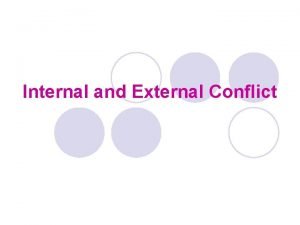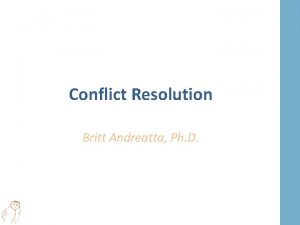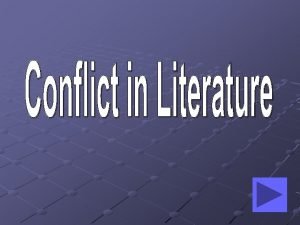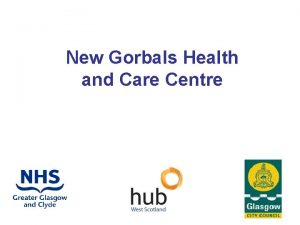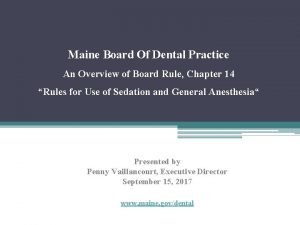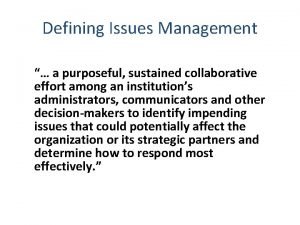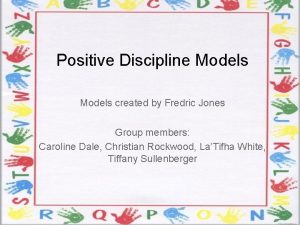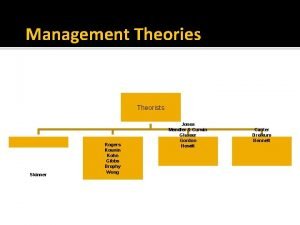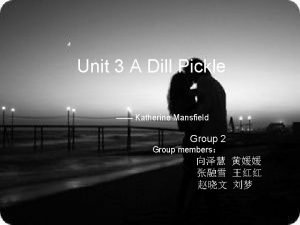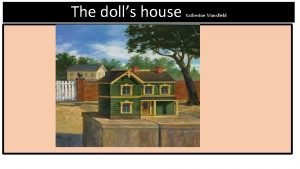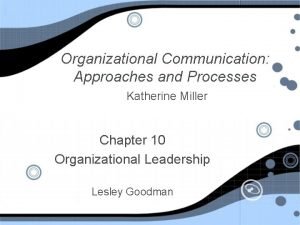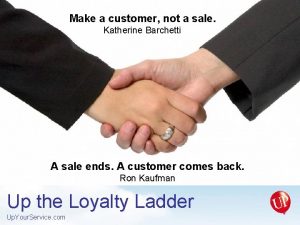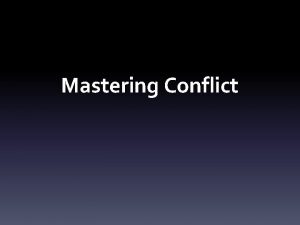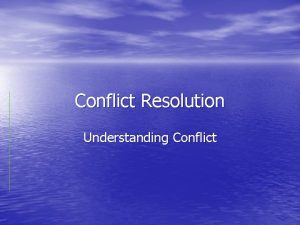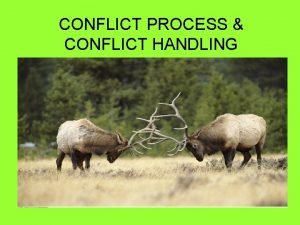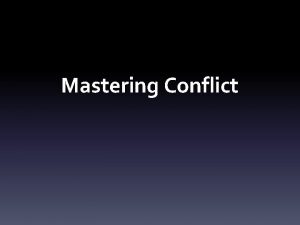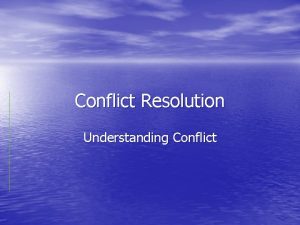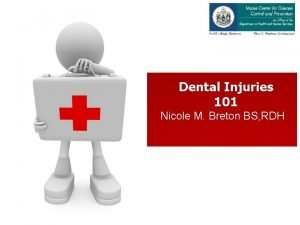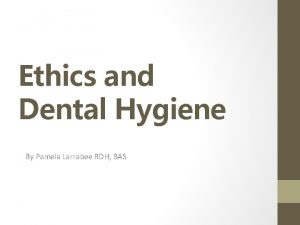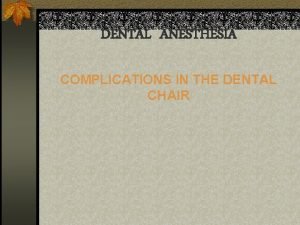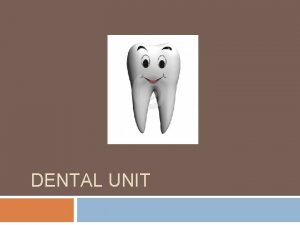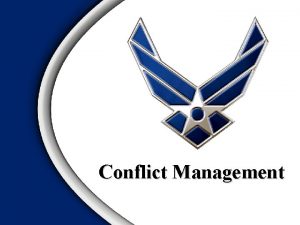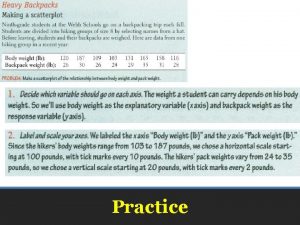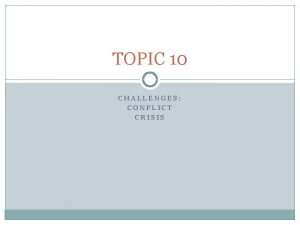CONFLICT MANAGEMENT Dental Practice Management Katherine Jones RDH


















- Slides: 18

CONFLICT MANAGEMENT Dental Practice Management Katherine Jones, RDH, BS

Learning Objectives Identify conflict ØUnderstand the cause and effect of conflict ØExamine various methods of conflict resolution ØUtilize reflective listening and feedback ØIncorporate management skills into team dynamics when conflict occurs Ø

Identify Conflict Can you think of a time in your life when conflict occurred? Identify a situation in your personal or professional life in which conflict occurred. Discuss why the conflict occurred, how the situation was handled and what the outcome was. Note to students: These situations may be chosen to be used as case studies and shared with classmates for assignment #2 (WIMBA meeting). No more than 1 page in length. * To be emailed to the professors by Wednesday evening.

Cause of Conflict Discord of action and feeling occurs almost every day in both personal and professional life v v A variety of backgrounds and experiences influence people’ beliefs and actions People’s actions and ideas are not always compatible with one another’s

Effects of Conflict: Negative & Positive The outcome of conflict depends on how it is managed.

Negative Effects of Conflict Anger v Stress v Avoidance v Resentment v Employee turnover v Reduced productivity v A sense of dissatisfaction v Personal/organizational loss v

Positive Effects of Conflict A shift in job responsibilities v Stop habits that irritate others v Alternative ways of doing things v Employee retention v A greater sense of interdependence, trust, teamwork and social closeness v Increased job satisfaction, productivity v Meet the organization’s mission v

Conflict Resolution Strategies Definition Result Positive/Negative Accommodating Living with the conflict and hoping it will go away or smooth over No one Loses or Wins Negative Competition The stronger/more forceful of the parties in the conflict “wins”- bullying One Wins/ One Loses Resentment and avoidance Negative Compromising Both parties give up part of what they want through negotiation Win some /Lose some Neither party is fully satisfied with the result Negative Avoiding One of the parties leaves, quits, is sick or stays away from troublesome person or situation No winners/No losers Anger, reduced productivity, a sense of dissatisfaction, personal/organizational loss Negative Collaborating Parties involved hammer out an agreement that is mutually satisfactory and does not require a great sacrifice on anyone’s part. It provides a growing experience, takes time. Win/Win Fosters a greater sense of interdependence, trust, teamwork and social closeness. Increased job satisfaction, productivity and meets the organization’s mission. Positive

Collaboration The goal of conflict resolution is collaboration in which all parties involved are appeased.

Reflective Listening Reflective listening is a process that involves: 1) The listener seeks to understand the speaker's idea Ø Ø 2) The listener recaps the message using his own words to ensure that the idea was correctly understood Ø Ø 3) The person delivering the message then clarifies what they are saying to make certain communication is effective Actively engage in the conversation Empathize with the speaker Reflect speakers emotional state with words and nonverbal communication Summarize the message using the listeners own words.

Reflective Listening in Conflict Resolution Clarify what has been decided and what decision has been reached. If something is unclear or inaccurate it can be addressed at that time. Example: “It sounds like you two have agreed upon a solution regarding XXXX. Let’s see if I understand. Whenever XXX you will XXX. ”

Feedback When you (specify behavior carefully), I feel (specify your reaction), because (give your reason and possible outcomes). Example: “When you are late for your appointment, I feel anxious, because I know I’ll be behind for all my patients the rest of the day. ” “When you come in a few minutes early, I feel really good about having hired you, because you seem like you really want to contribute to this practice. ” After giving a direct statement, wait for the person’s response.

Incorporate Management Skills Into Team Dynamics When Conflict Occurs

Steps in Conflict Management: 1) Early conflict prevention takes place during the interview process: � See if applicants belief’s lend to a team atmosphere � Ask during interview how previous employer handled conflict � Develop and maintain cohesiveness of team through verbal skills training and conflict resolution training

Steps in Conflict Management (Cont…) 2) Identify conflict - recognize that a problem exists 3) Understand cause and effect of conflict 4) Determine if conflict needs to be managed, or if the two people/parties involved can reach an agreement on their own

Role in Conflict Resolution (if conflict needs mediation): 5) Select a time to discuss the issue 6) Confrontation- Bring people together in an open atmosphere to clarify the nature of the conflict, and discuss the situation and a resolution � Make sure that each of the people involved can fully explain the other person’s point of view as well as his/her own � Ask for and help define a strategy for settling the conflict agreeable to all people involved 7) Monitor compliance with and effectiveness of the solution

Resourc es Bolton, Robert. People Skills: How to Assert Yourself, Listen to Others, and Resolve Conflicts. New York: Simon & Schuster, 1986. Kimbrough-Walls, Vickie J. , and Charla J. Lautar. Ethics, Jurisprudence, & Practice Management in Dental Hygiene. Upper Saddle River, NJ: Pearson Prentice Hall, 2007. Rattan, Raj, and George Manolescue. The Business of Dentistry. London: Quintessence Pub. , 2002. Woodall, Irene R. , and J. Marvin. Bentley. Legal, Ethical, and Management Aspects of the Dental Care System. St. Louis: Mosby, 1987.

 External conflict and internal conflict examples
External conflict and internal conflict examples What is conflict and conflict resolution?
What is conflict and conflict resolution? Internal conflict definition and examples
Internal conflict definition and examples Gorbals health centre
Gorbals health centre Maine board of dentistry
Maine board of dentistry Define issue management
Define issue management Jones theory of classroom management
Jones theory of classroom management Fredric jones
Fredric jones Bf skinner classroom management theory
Bf skinner classroom management theory Myeplg
Myeplg A dill pickle analysis
A dill pickle analysis The last dog by katherine paterson audio
The last dog by katherine paterson audio The fly by katherine mansfield theme
The fly by katherine mansfield theme A doll's house katherine mansfield
A doll's house katherine mansfield Katherine harrington md
Katherine harrington md Organizational communication approaches and processes
Organizational communication approaches and processes Make a customer not a sale
Make a customer not a sale Viviana katherine xxx
Viviana katherine xxx Katherine johnson quotes
Katherine johnson quotes
